Analysis of Transportation Management in Petronas Chemicals Company
VerifiedAdded on 2023/06/05
|9
|2894
|316
Report
AI Summary
This report critically analyzes the transportation management practices of Petronas Chemicals Company, a major chemical producer based in Malaysia. It delves into the effectiveness of their transportation capabilities, offering recommendations on appropriate Incoterms such as CFR and CIF to optimize cost control. The report examines Petronas's transportation goals and needs, including timely delivery and product-specific handling, and suggests criteria for carrier selection, emphasizing availability, routes, and product compatibility. Furthermore, it evaluates the types of carrier relationships, advocating for collaborative partnerships to ensure safety, optimize packaging, and promote environmental responsibility. The analysis highlights the role of Petronas Chemicals Marketing Labuan Limited (PCML) in managing transport logistics, from planning and execution to value-added services. The report underscores the importance of these strategies in maintaining market share, controlling costs, and fostering strong relationships within the supply chain.
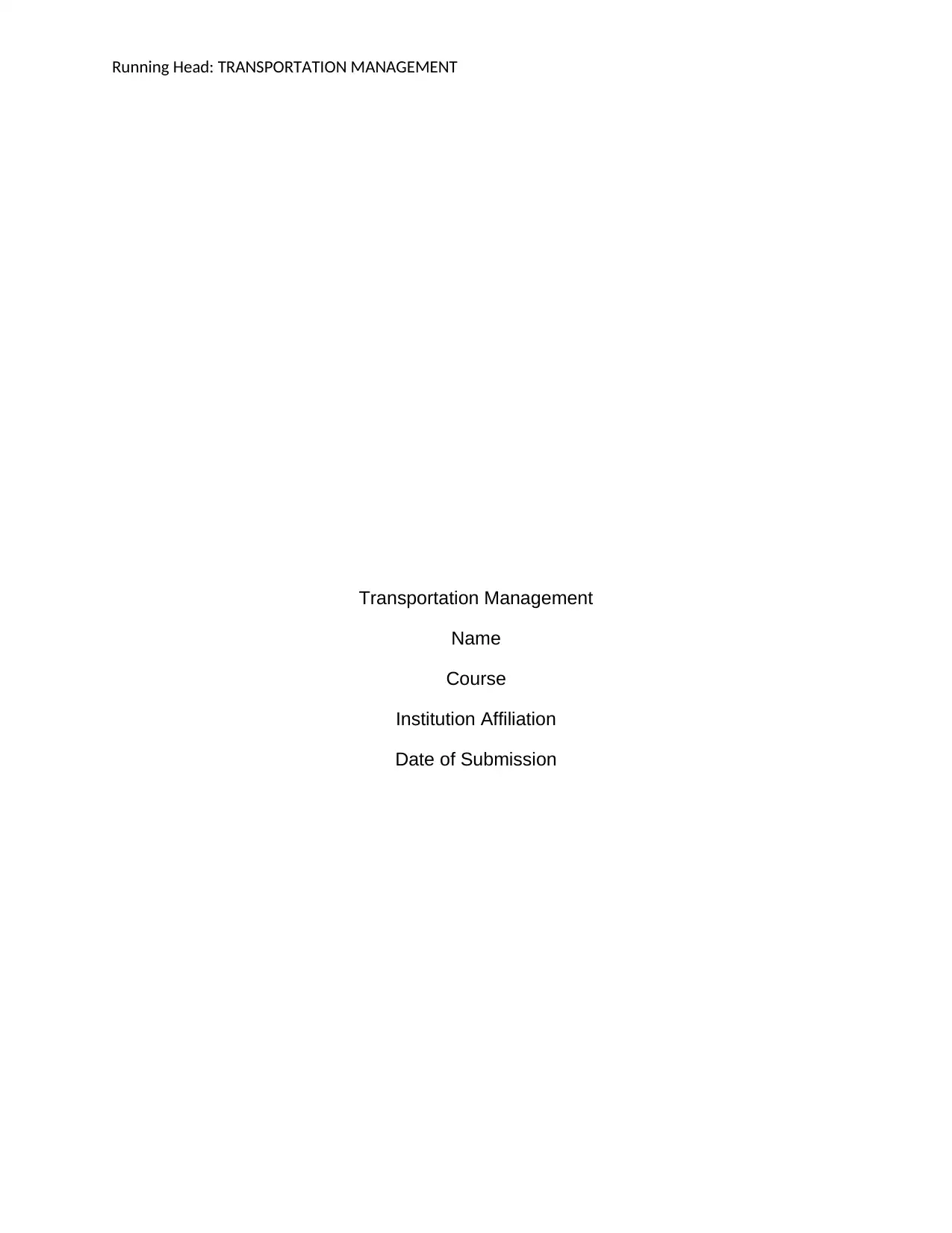
Running Head: TRANSPORTATION MANAGEMENT
Transportation Management
Name
Course
Institution Affiliation
Date of Submission
Transportation Management
Name
Course
Institution Affiliation
Date of Submission
Paraphrase This Document
Need a fresh take? Get an instant paraphrase of this document with our AI Paraphraser
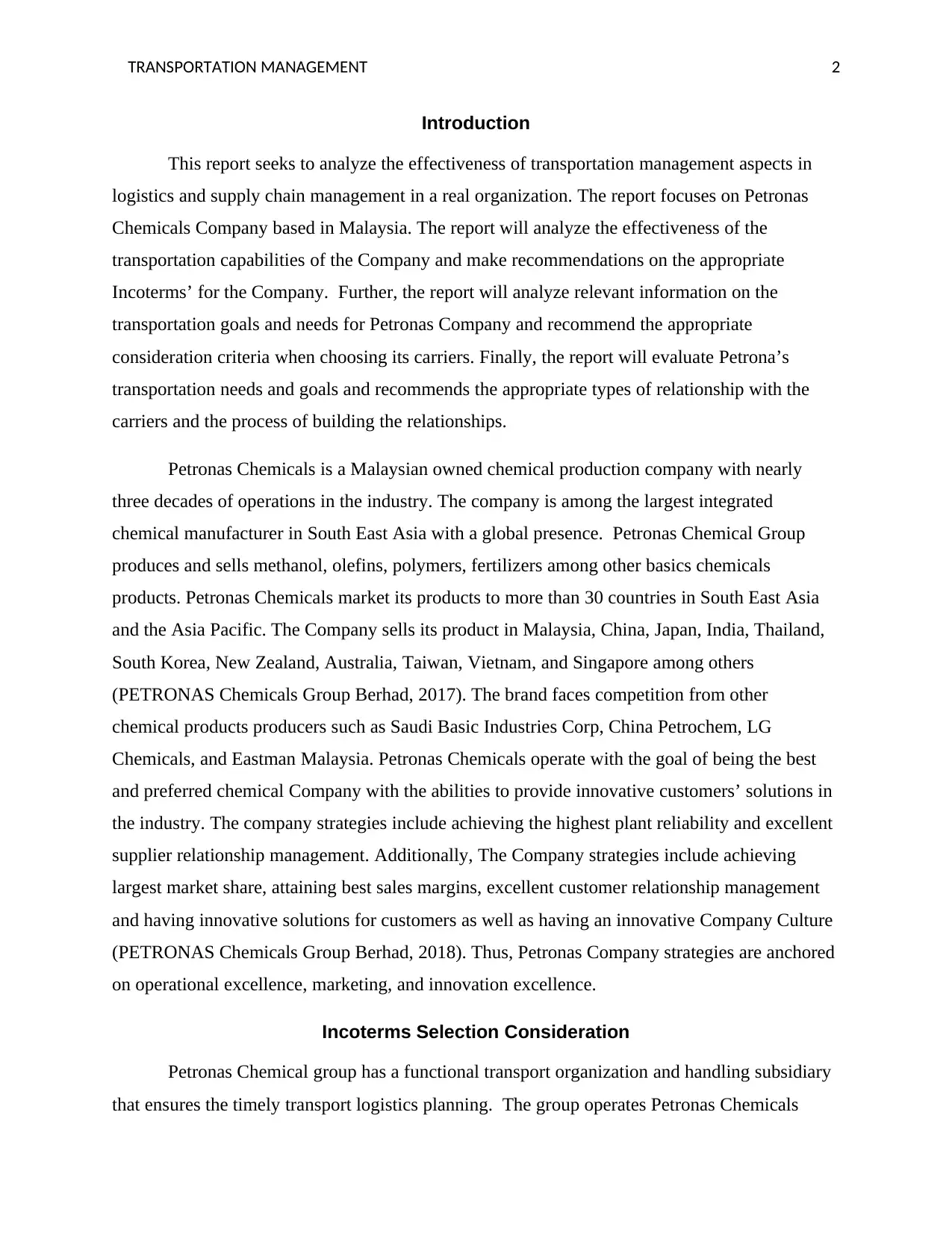
TRANSPORTATION MANAGEMENT 2
Introduction
This report seeks to analyze the effectiveness of transportation management aspects in
logistics and supply chain management in a real organization. The report focuses on Petronas
Chemicals Company based in Malaysia. The report will analyze the effectiveness of the
transportation capabilities of the Company and make recommendations on the appropriate
Incoterms’ for the Company. Further, the report will analyze relevant information on the
transportation goals and needs for Petronas Company and recommend the appropriate
consideration criteria when choosing its carriers. Finally, the report will evaluate Petrona’s
transportation needs and goals and recommends the appropriate types of relationship with the
carriers and the process of building the relationships.
Petronas Chemicals is a Malaysian owned chemical production company with nearly
three decades of operations in the industry. The company is among the largest integrated
chemical manufacturer in South East Asia with a global presence. Petronas Chemical Group
produces and sells methanol, olefins, polymers, fertilizers among other basics chemicals
products. Petronas Chemicals market its products to more than 30 countries in South East Asia
and the Asia Pacific. The Company sells its product in Malaysia, China, Japan, India, Thailand,
South Korea, New Zealand, Australia, Taiwan, Vietnam, and Singapore among others
(PETRONAS Chemicals Group Berhad, 2017). The brand faces competition from other
chemical products producers such as Saudi Basic Industries Corp, China Petrochem, LG
Chemicals, and Eastman Malaysia. Petronas Chemicals operate with the goal of being the best
and preferred chemical Company with the abilities to provide innovative customers’ solutions in
the industry. The company strategies include achieving the highest plant reliability and excellent
supplier relationship management. Additionally, The Company strategies include achieving
largest market share, attaining best sales margins, excellent customer relationship management
and having innovative solutions for customers as well as having an innovative Company Culture
(PETRONAS Chemicals Group Berhad, 2018). Thus, Petronas Company strategies are anchored
on operational excellence, marketing, and innovation excellence.
Incoterms Selection Consideration
Petronas Chemical group has a functional transport organization and handling subsidiary
that ensures the timely transport logistics planning. The group operates Petronas Chemicals
Introduction
This report seeks to analyze the effectiveness of transportation management aspects in
logistics and supply chain management in a real organization. The report focuses on Petronas
Chemicals Company based in Malaysia. The report will analyze the effectiveness of the
transportation capabilities of the Company and make recommendations on the appropriate
Incoterms’ for the Company. Further, the report will analyze relevant information on the
transportation goals and needs for Petronas Company and recommend the appropriate
consideration criteria when choosing its carriers. Finally, the report will evaluate Petrona’s
transportation needs and goals and recommends the appropriate types of relationship with the
carriers and the process of building the relationships.
Petronas Chemicals is a Malaysian owned chemical production company with nearly
three decades of operations in the industry. The company is among the largest integrated
chemical manufacturer in South East Asia with a global presence. Petronas Chemical Group
produces and sells methanol, olefins, polymers, fertilizers among other basics chemicals
products. Petronas Chemicals market its products to more than 30 countries in South East Asia
and the Asia Pacific. The Company sells its product in Malaysia, China, Japan, India, Thailand,
South Korea, New Zealand, Australia, Taiwan, Vietnam, and Singapore among others
(PETRONAS Chemicals Group Berhad, 2017). The brand faces competition from other
chemical products producers such as Saudi Basic Industries Corp, China Petrochem, LG
Chemicals, and Eastman Malaysia. Petronas Chemicals operate with the goal of being the best
and preferred chemical Company with the abilities to provide innovative customers’ solutions in
the industry. The company strategies include achieving the highest plant reliability and excellent
supplier relationship management. Additionally, The Company strategies include achieving
largest market share, attaining best sales margins, excellent customer relationship management
and having innovative solutions for customers as well as having an innovative Company Culture
(PETRONAS Chemicals Group Berhad, 2018). Thus, Petronas Company strategies are anchored
on operational excellence, marketing, and innovation excellence.
Incoterms Selection Consideration
Petronas Chemical group has a functional transport organization and handling subsidiary
that ensures the timely transport logistics planning. The group operates Petronas Chemicals
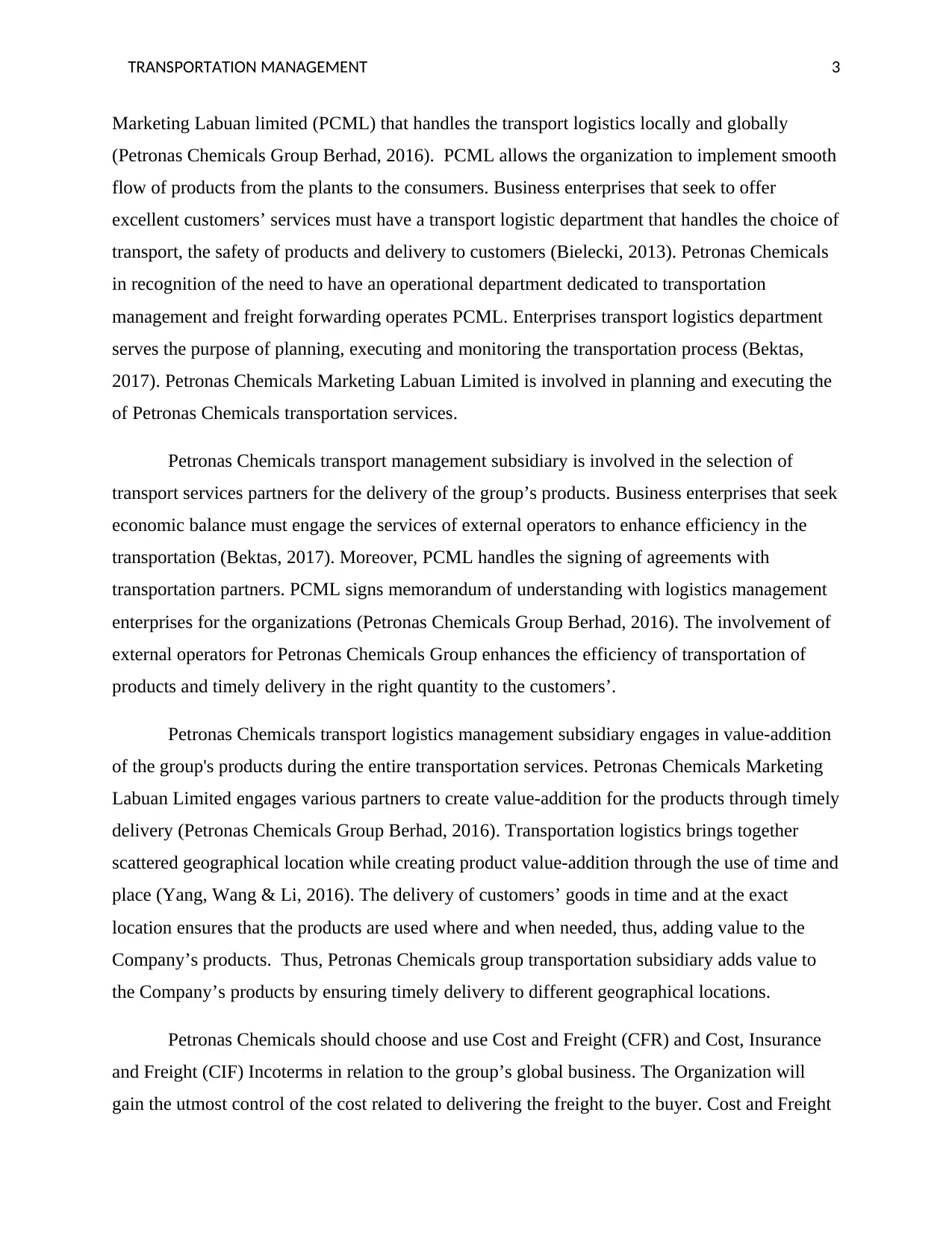
TRANSPORTATION MANAGEMENT 3
Marketing Labuan limited (PCML) that handles the transport logistics locally and globally
(Petronas Chemicals Group Berhad, 2016). PCML allows the organization to implement smooth
flow of products from the plants to the consumers. Business enterprises that seek to offer
excellent customers’ services must have a transport logistic department that handles the choice of
transport, the safety of products and delivery to customers (Bielecki, 2013). Petronas Chemicals
in recognition of the need to have an operational department dedicated to transportation
management and freight forwarding operates PCML. Enterprises transport logistics department
serves the purpose of planning, executing and monitoring the transportation process (Bektas,
2017). Petronas Chemicals Marketing Labuan Limited is involved in planning and executing the
of Petronas Chemicals transportation services.
Petronas Chemicals transport management subsidiary is involved in the selection of
transport services partners for the delivery of the group’s products. Business enterprises that seek
economic balance must engage the services of external operators to enhance efficiency in the
transportation (Bektas, 2017). Moreover, PCML handles the signing of agreements with
transportation partners. PCML signs memorandum of understanding with logistics management
enterprises for the organizations (Petronas Chemicals Group Berhad, 2016). The involvement of
external operators for Petronas Chemicals Group enhances the efficiency of transportation of
products and timely delivery in the right quantity to the customers’.
Petronas Chemicals transport logistics management subsidiary engages in value-addition
of the group's products during the entire transportation services. Petronas Chemicals Marketing
Labuan Limited engages various partners to create value-addition for the products through timely
delivery (Petronas Chemicals Group Berhad, 2016). Transportation logistics brings together
scattered geographical location while creating product value-addition through the use of time and
place (Yang, Wang & Li, 2016). The delivery of customers’ goods in time and at the exact
location ensures that the products are used where and when needed, thus, adding value to the
Company’s products. Thus, Petronas Chemicals group transportation subsidiary adds value to
the Company’s products by ensuring timely delivery to different geographical locations.
Petronas Chemicals should choose and use Cost and Freight (CFR) and Cost, Insurance
and Freight (CIF) Incoterms in relation to the group’s global business. The Organization will
gain the utmost control of the cost related to delivering the freight to the buyer. Cost and Freight
Marketing Labuan limited (PCML) that handles the transport logistics locally and globally
(Petronas Chemicals Group Berhad, 2016). PCML allows the organization to implement smooth
flow of products from the plants to the consumers. Business enterprises that seek to offer
excellent customers’ services must have a transport logistic department that handles the choice of
transport, the safety of products and delivery to customers (Bielecki, 2013). Petronas Chemicals
in recognition of the need to have an operational department dedicated to transportation
management and freight forwarding operates PCML. Enterprises transport logistics department
serves the purpose of planning, executing and monitoring the transportation process (Bektas,
2017). Petronas Chemicals Marketing Labuan Limited is involved in planning and executing the
of Petronas Chemicals transportation services.
Petronas Chemicals transport management subsidiary is involved in the selection of
transport services partners for the delivery of the group’s products. Business enterprises that seek
economic balance must engage the services of external operators to enhance efficiency in the
transportation (Bektas, 2017). Moreover, PCML handles the signing of agreements with
transportation partners. PCML signs memorandum of understanding with logistics management
enterprises for the organizations (Petronas Chemicals Group Berhad, 2016). The involvement of
external operators for Petronas Chemicals Group enhances the efficiency of transportation of
products and timely delivery in the right quantity to the customers’.
Petronas Chemicals transport logistics management subsidiary engages in value-addition
of the group's products during the entire transportation services. Petronas Chemicals Marketing
Labuan Limited engages various partners to create value-addition for the products through timely
delivery (Petronas Chemicals Group Berhad, 2016). Transportation logistics brings together
scattered geographical location while creating product value-addition through the use of time and
place (Yang, Wang & Li, 2016). The delivery of customers’ goods in time and at the exact
location ensures that the products are used where and when needed, thus, adding value to the
Company’s products. Thus, Petronas Chemicals group transportation subsidiary adds value to
the Company’s products by ensuring timely delivery to different geographical locations.
Petronas Chemicals should choose and use Cost and Freight (CFR) and Cost, Insurance
and Freight (CIF) Incoterms in relation to the group’s global business. The Organization will
gain the utmost control of the cost related to delivering the freight to the buyer. Cost and Freight
⊘ This is a preview!⊘
Do you want full access?
Subscribe today to unlock all pages.

Trusted by 1+ million students worldwide
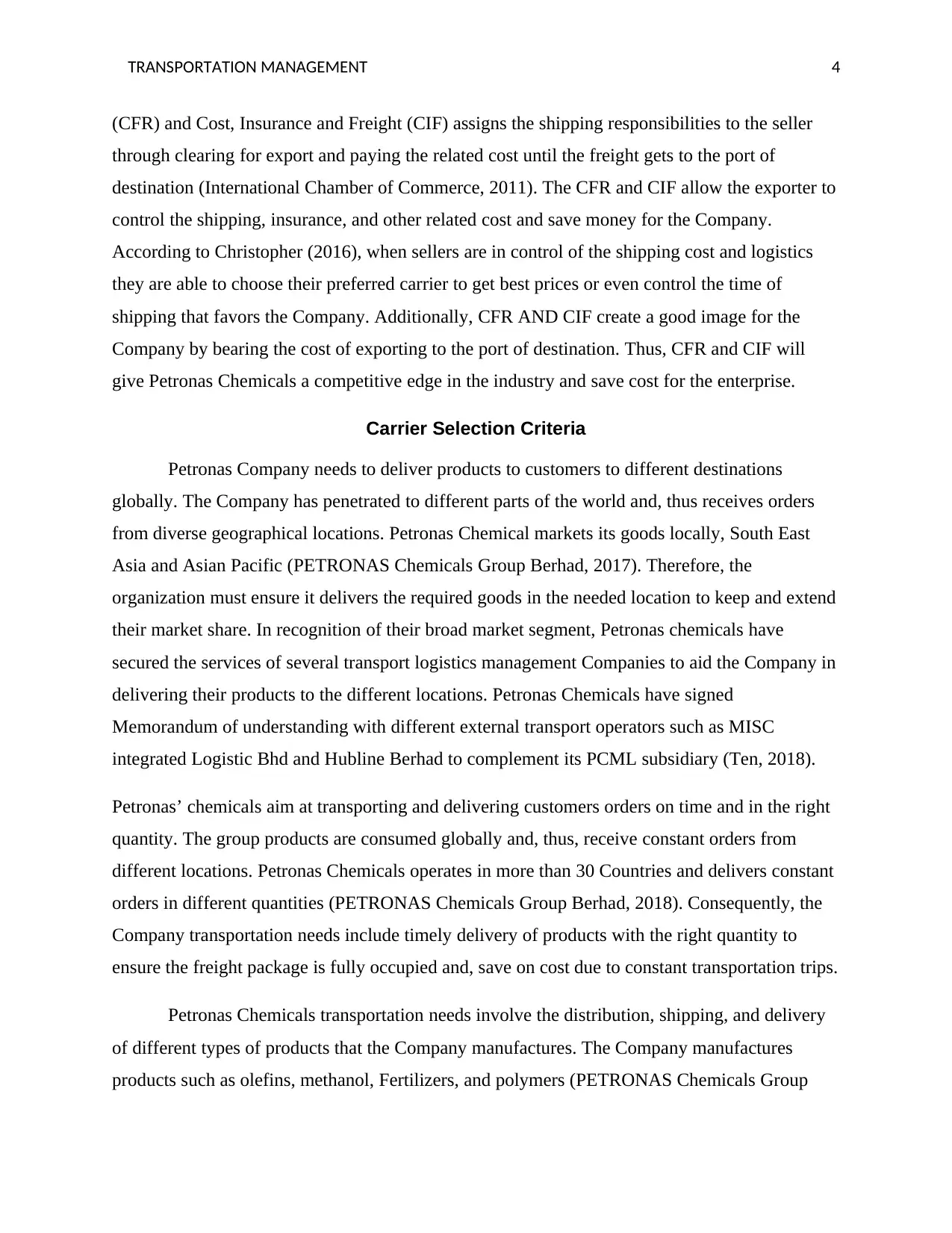
TRANSPORTATION MANAGEMENT 4
(CFR) and Cost, Insurance and Freight (CIF) assigns the shipping responsibilities to the seller
through clearing for export and paying the related cost until the freight gets to the port of
destination (International Chamber of Commerce, 2011). The CFR and CIF allow the exporter to
control the shipping, insurance, and other related cost and save money for the Company.
According to Christopher (2016), when sellers are in control of the shipping cost and logistics
they are able to choose their preferred carrier to get best prices or even control the time of
shipping that favors the Company. Additionally, CFR AND CIF create a good image for the
Company by bearing the cost of exporting to the port of destination. Thus, CFR and CIF will
give Petronas Chemicals a competitive edge in the industry and save cost for the enterprise.
Carrier Selection Criteria
Petronas Company needs to deliver products to customers to different destinations
globally. The Company has penetrated to different parts of the world and, thus receives orders
from diverse geographical locations. Petronas Chemical markets its goods locally, South East
Asia and Asian Pacific (PETRONAS Chemicals Group Berhad, 2017). Therefore, the
organization must ensure it delivers the required goods in the needed location to keep and extend
their market share. In recognition of their broad market segment, Petronas chemicals have
secured the services of several transport logistics management Companies to aid the Company in
delivering their products to the different locations. Petronas Chemicals have signed
Memorandum of understanding with different external transport operators such as MISC
integrated Logistic Bhd and Hubline Berhad to complement its PCML subsidiary (Ten, 2018).
Petronas’ chemicals aim at transporting and delivering customers orders on time and in the right
quantity. The group products are consumed globally and, thus, receive constant orders from
different locations. Petronas Chemicals operates in more than 30 Countries and delivers constant
orders in different quantities (PETRONAS Chemicals Group Berhad, 2018). Consequently, the
Company transportation needs include timely delivery of products with the right quantity to
ensure the freight package is fully occupied and, save on cost due to constant transportation trips.
Petronas Chemicals transportation needs involve the distribution, shipping, and delivery
of different types of products that the Company manufactures. The Company manufactures
products such as olefins, methanol, Fertilizers, and polymers (PETRONAS Chemicals Group
(CFR) and Cost, Insurance and Freight (CIF) assigns the shipping responsibilities to the seller
through clearing for export and paying the related cost until the freight gets to the port of
destination (International Chamber of Commerce, 2011). The CFR and CIF allow the exporter to
control the shipping, insurance, and other related cost and save money for the Company.
According to Christopher (2016), when sellers are in control of the shipping cost and logistics
they are able to choose their preferred carrier to get best prices or even control the time of
shipping that favors the Company. Additionally, CFR AND CIF create a good image for the
Company by bearing the cost of exporting to the port of destination. Thus, CFR and CIF will
give Petronas Chemicals a competitive edge in the industry and save cost for the enterprise.
Carrier Selection Criteria
Petronas Company needs to deliver products to customers to different destinations
globally. The Company has penetrated to different parts of the world and, thus receives orders
from diverse geographical locations. Petronas Chemical markets its goods locally, South East
Asia and Asian Pacific (PETRONAS Chemicals Group Berhad, 2017). Therefore, the
organization must ensure it delivers the required goods in the needed location to keep and extend
their market share. In recognition of their broad market segment, Petronas chemicals have
secured the services of several transport logistics management Companies to aid the Company in
delivering their products to the different locations. Petronas Chemicals have signed
Memorandum of understanding with different external transport operators such as MISC
integrated Logistic Bhd and Hubline Berhad to complement its PCML subsidiary (Ten, 2018).
Petronas’ chemicals aim at transporting and delivering customers orders on time and in the right
quantity. The group products are consumed globally and, thus, receive constant orders from
different locations. Petronas Chemicals operates in more than 30 Countries and delivers constant
orders in different quantities (PETRONAS Chemicals Group Berhad, 2018). Consequently, the
Company transportation needs include timely delivery of products with the right quantity to
ensure the freight package is fully occupied and, save on cost due to constant transportation trips.
Petronas Chemicals transportation needs involve the distribution, shipping, and delivery
of different types of products that the Company manufactures. The Company manufactures
products such as olefins, methanol, Fertilizers, and polymers (PETRONAS Chemicals Group
Paraphrase This Document
Need a fresh take? Get an instant paraphrase of this document with our AI Paraphraser
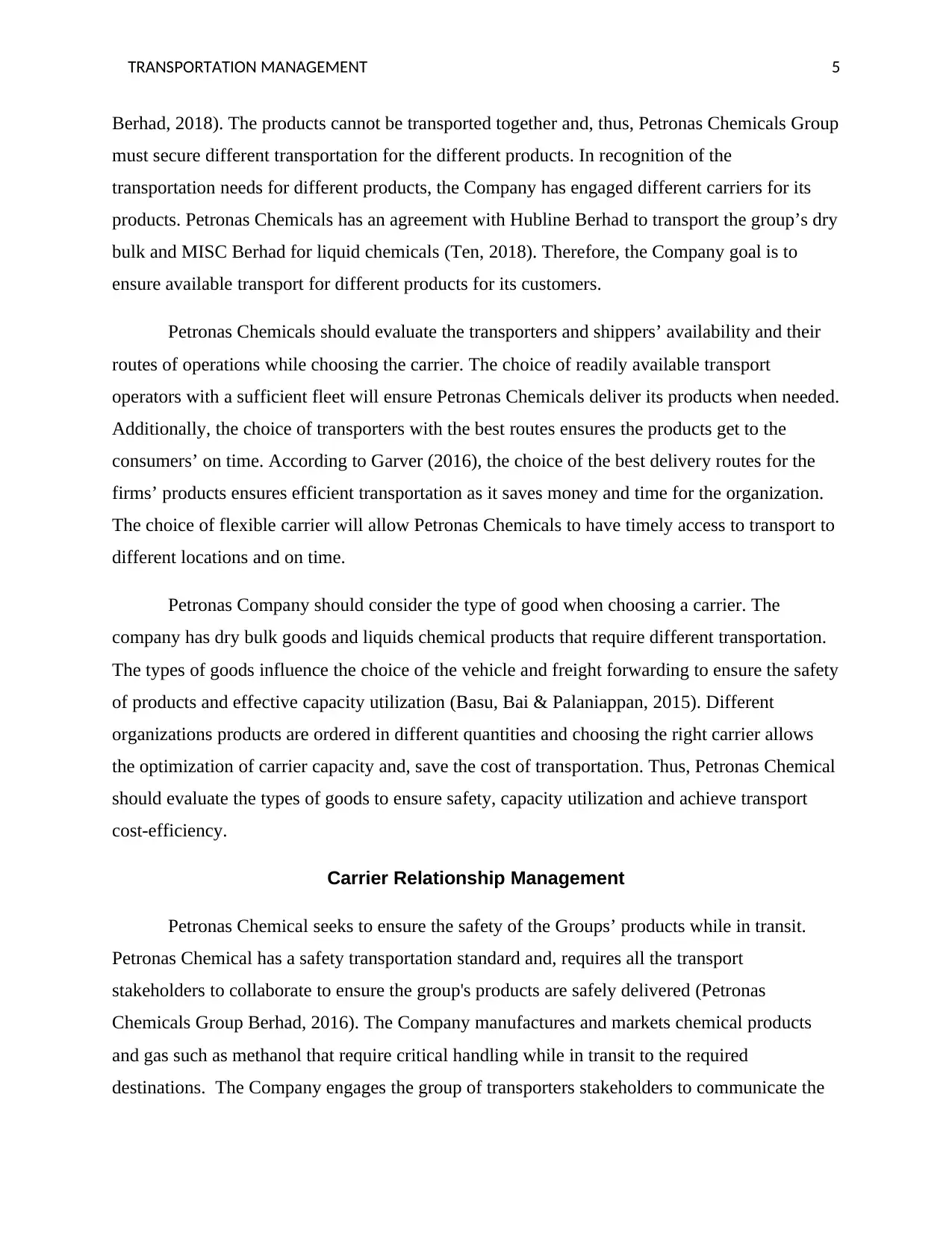
TRANSPORTATION MANAGEMENT 5
Berhad, 2018). The products cannot be transported together and, thus, Petronas Chemicals Group
must secure different transportation for the different products. In recognition of the
transportation needs for different products, the Company has engaged different carriers for its
products. Petronas Chemicals has an agreement with Hubline Berhad to transport the group’s dry
bulk and MISC Berhad for liquid chemicals (Ten, 2018). Therefore, the Company goal is to
ensure available transport for different products for its customers.
Petronas Chemicals should evaluate the transporters and shippers’ availability and their
routes of operations while choosing the carrier. The choice of readily available transport
operators with a sufficient fleet will ensure Petronas Chemicals deliver its products when needed.
Additionally, the choice of transporters with the best routes ensures the products get to the
consumers’ on time. According to Garver (2016), the choice of the best delivery routes for the
firms’ products ensures efficient transportation as it saves money and time for the organization.
The choice of flexible carrier will allow Petronas Chemicals to have timely access to transport to
different locations and on time.
Petronas Company should consider the type of good when choosing a carrier. The
company has dry bulk goods and liquids chemical products that require different transportation.
The types of goods influence the choice of the vehicle and freight forwarding to ensure the safety
of products and effective capacity utilization (Basu, Bai & Palaniappan, 2015). Different
organizations products are ordered in different quantities and choosing the right carrier allows
the optimization of carrier capacity and, save the cost of transportation. Thus, Petronas Chemical
should evaluate the types of goods to ensure safety, capacity utilization and achieve transport
cost-efficiency.
Carrier Relationship Management
Petronas Chemical seeks to ensure the safety of the Groups’ products while in transit.
Petronas Chemical has a safety transportation standard and, requires all the transport
stakeholders to collaborate to ensure the group's products are safely delivered (Petronas
Chemicals Group Berhad, 2016). The Company manufactures and markets chemical products
and gas such as methanol that require critical handling while in transit to the required
destinations. The Company engages the group of transporters stakeholders to communicate the
Berhad, 2018). The products cannot be transported together and, thus, Petronas Chemicals Group
must secure different transportation for the different products. In recognition of the
transportation needs for different products, the Company has engaged different carriers for its
products. Petronas Chemicals has an agreement with Hubline Berhad to transport the group’s dry
bulk and MISC Berhad for liquid chemicals (Ten, 2018). Therefore, the Company goal is to
ensure available transport for different products for its customers.
Petronas Chemicals should evaluate the transporters and shippers’ availability and their
routes of operations while choosing the carrier. The choice of readily available transport
operators with a sufficient fleet will ensure Petronas Chemicals deliver its products when needed.
Additionally, the choice of transporters with the best routes ensures the products get to the
consumers’ on time. According to Garver (2016), the choice of the best delivery routes for the
firms’ products ensures efficient transportation as it saves money and time for the organization.
The choice of flexible carrier will allow Petronas Chemicals to have timely access to transport to
different locations and on time.
Petronas Company should consider the type of good when choosing a carrier. The
company has dry bulk goods and liquids chemical products that require different transportation.
The types of goods influence the choice of the vehicle and freight forwarding to ensure the safety
of products and effective capacity utilization (Basu, Bai & Palaniappan, 2015). Different
organizations products are ordered in different quantities and choosing the right carrier allows
the optimization of carrier capacity and, save the cost of transportation. Thus, Petronas Chemical
should evaluate the types of goods to ensure safety, capacity utilization and achieve transport
cost-efficiency.
Carrier Relationship Management
Petronas Chemical seeks to ensure the safety of the Groups’ products while in transit.
Petronas Chemical has a safety transportation standard and, requires all the transport
stakeholders to collaborate to ensure the group's products are safely delivered (Petronas
Chemicals Group Berhad, 2016). The Company manufactures and markets chemical products
and gas such as methanol that require critical handling while in transit to the required
destinations. The Company engages the group of transporters stakeholders to communicate the
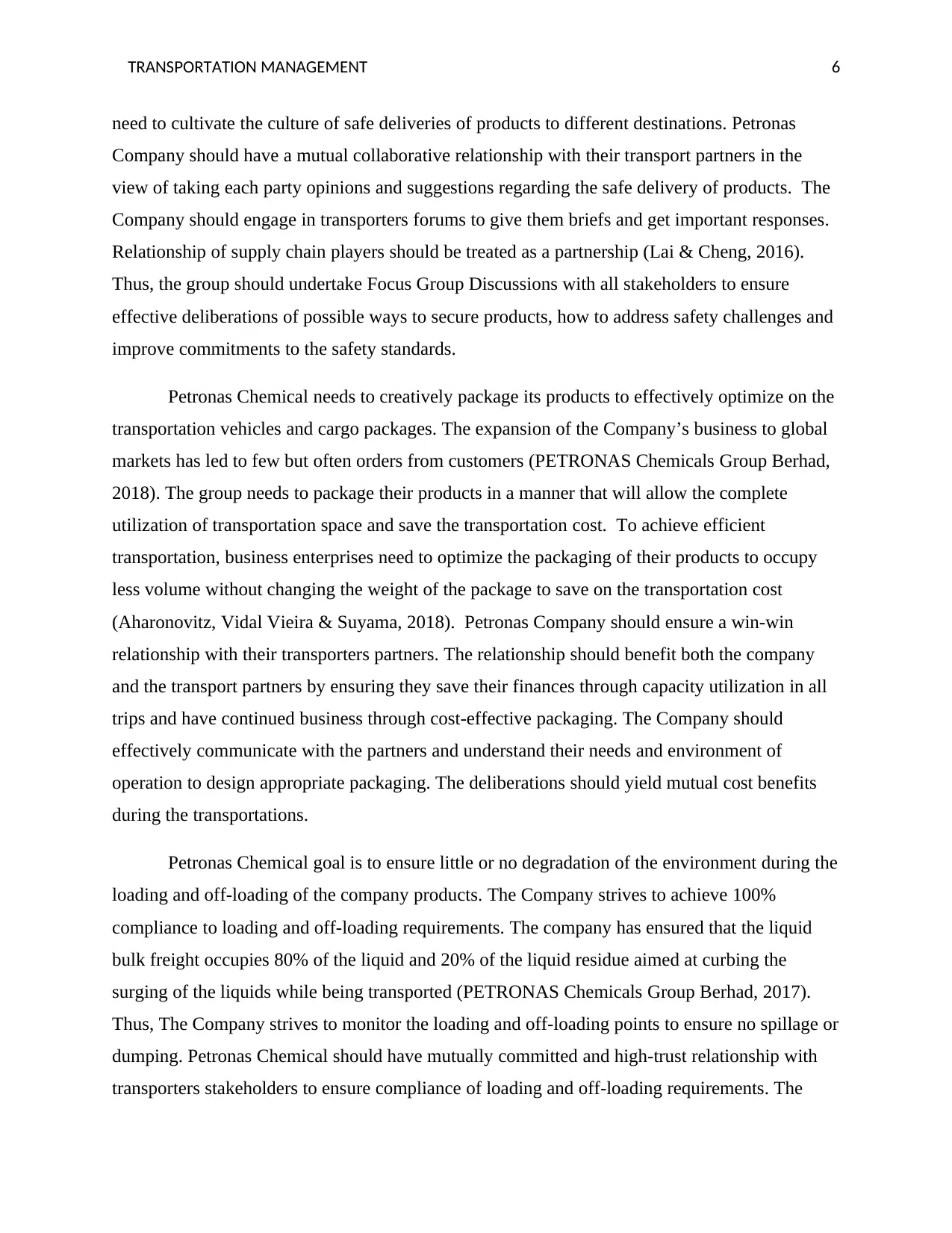
TRANSPORTATION MANAGEMENT 6
need to cultivate the culture of safe deliveries of products to different destinations. Petronas
Company should have a mutual collaborative relationship with their transport partners in the
view of taking each party opinions and suggestions regarding the safe delivery of products. The
Company should engage in transporters forums to give them briefs and get important responses.
Relationship of supply chain players should be treated as a partnership (Lai & Cheng, 2016).
Thus, the group should undertake Focus Group Discussions with all stakeholders to ensure
effective deliberations of possible ways to secure products, how to address safety challenges and
improve commitments to the safety standards.
Petronas Chemical needs to creatively package its products to effectively optimize on the
transportation vehicles and cargo packages. The expansion of the Company’s business to global
markets has led to few but often orders from customers (PETRONAS Chemicals Group Berhad,
2018). The group needs to package their products in a manner that will allow the complete
utilization of transportation space and save the transportation cost. To achieve efficient
transportation, business enterprises need to optimize the packaging of their products to occupy
less volume without changing the weight of the package to save on the transportation cost
(Aharonovitz, Vidal Vieira & Suyama, 2018). Petronas Company should ensure a win-win
relationship with their transporters partners. The relationship should benefit both the company
and the transport partners by ensuring they save their finances through capacity utilization in all
trips and have continued business through cost-effective packaging. The Company should
effectively communicate with the partners and understand their needs and environment of
operation to design appropriate packaging. The deliberations should yield mutual cost benefits
during the transportations.
Petronas Chemical goal is to ensure little or no degradation of the environment during the
loading and off-loading of the company products. The Company strives to achieve 100%
compliance to loading and off-loading requirements. The company has ensured that the liquid
bulk freight occupies 80% of the liquid and 20% of the liquid residue aimed at curbing the
surging of the liquids while being transported (PETRONAS Chemicals Group Berhad, 2017).
Thus, The Company strives to monitor the loading and off-loading points to ensure no spillage or
dumping. Petronas Chemical should have mutually committed and high-trust relationship with
transporters stakeholders to ensure compliance of loading and off-loading requirements. The
need to cultivate the culture of safe deliveries of products to different destinations. Petronas
Company should have a mutual collaborative relationship with their transport partners in the
view of taking each party opinions and suggestions regarding the safe delivery of products. The
Company should engage in transporters forums to give them briefs and get important responses.
Relationship of supply chain players should be treated as a partnership (Lai & Cheng, 2016).
Thus, the group should undertake Focus Group Discussions with all stakeholders to ensure
effective deliberations of possible ways to secure products, how to address safety challenges and
improve commitments to the safety standards.
Petronas Chemical needs to creatively package its products to effectively optimize on the
transportation vehicles and cargo packages. The expansion of the Company’s business to global
markets has led to few but often orders from customers (PETRONAS Chemicals Group Berhad,
2018). The group needs to package their products in a manner that will allow the complete
utilization of transportation space and save the transportation cost. To achieve efficient
transportation, business enterprises need to optimize the packaging of their products to occupy
less volume without changing the weight of the package to save on the transportation cost
(Aharonovitz, Vidal Vieira & Suyama, 2018). Petronas Company should ensure a win-win
relationship with their transporters partners. The relationship should benefit both the company
and the transport partners by ensuring they save their finances through capacity utilization in all
trips and have continued business through cost-effective packaging. The Company should
effectively communicate with the partners and understand their needs and environment of
operation to design appropriate packaging. The deliberations should yield mutual cost benefits
during the transportations.
Petronas Chemical goal is to ensure little or no degradation of the environment during the
loading and off-loading of the company products. The Company strives to achieve 100%
compliance to loading and off-loading requirements. The company has ensured that the liquid
bulk freight occupies 80% of the liquid and 20% of the liquid residue aimed at curbing the
surging of the liquids while being transported (PETRONAS Chemicals Group Berhad, 2017).
Thus, The Company strives to monitor the loading and off-loading points to ensure no spillage or
dumping. Petronas Chemical should have mutually committed and high-trust relationship with
transporters stakeholders to ensure compliance of loading and off-loading requirements. The
⊘ This is a preview!⊘
Do you want full access?
Subscribe today to unlock all pages.

Trusted by 1+ million students worldwide
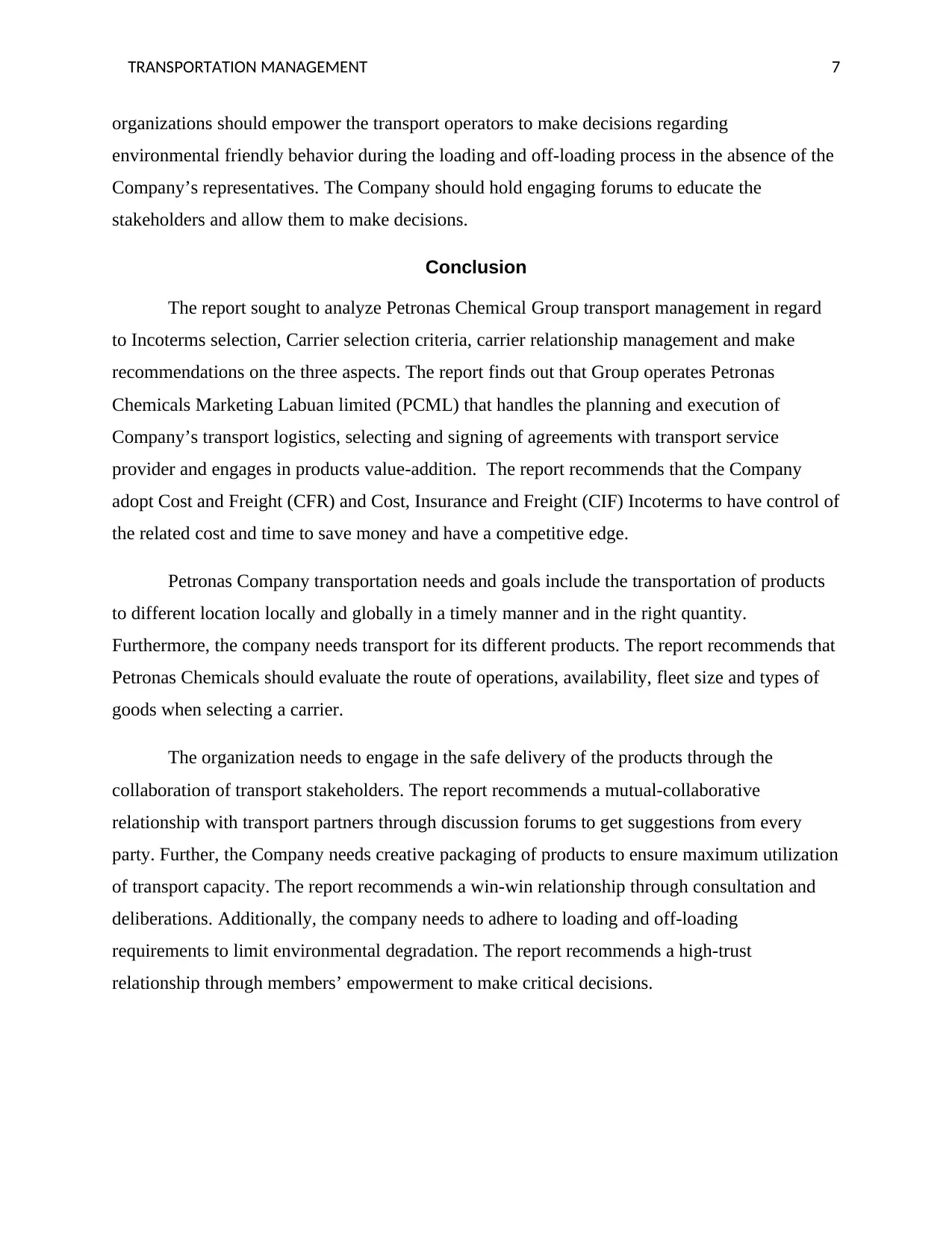
TRANSPORTATION MANAGEMENT 7
organizations should empower the transport operators to make decisions regarding
environmental friendly behavior during the loading and off-loading process in the absence of the
Company’s representatives. The Company should hold engaging forums to educate the
stakeholders and allow them to make decisions.
Conclusion
The report sought to analyze Petronas Chemical Group transport management in regard
to Incoterms selection, Carrier selection criteria, carrier relationship management and make
recommendations on the three aspects. The report finds out that Group operates Petronas
Chemicals Marketing Labuan limited (PCML) that handles the planning and execution of
Company’s transport logistics, selecting and signing of agreements with transport service
provider and engages in products value-addition. The report recommends that the Company
adopt Cost and Freight (CFR) and Cost, Insurance and Freight (CIF) Incoterms to have control of
the related cost and time to save money and have a competitive edge.
Petronas Company transportation needs and goals include the transportation of products
to different location locally and globally in a timely manner and in the right quantity.
Furthermore, the company needs transport for its different products. The report recommends that
Petronas Chemicals should evaluate the route of operations, availability, fleet size and types of
goods when selecting a carrier.
The organization needs to engage in the safe delivery of the products through the
collaboration of transport stakeholders. The report recommends a mutual-collaborative
relationship with transport partners through discussion forums to get suggestions from every
party. Further, the Company needs creative packaging of products to ensure maximum utilization
of transport capacity. The report recommends a win-win relationship through consultation and
deliberations. Additionally, the company needs to adhere to loading and off-loading
requirements to limit environmental degradation. The report recommends a high-trust
relationship through members’ empowerment to make critical decisions.
organizations should empower the transport operators to make decisions regarding
environmental friendly behavior during the loading and off-loading process in the absence of the
Company’s representatives. The Company should hold engaging forums to educate the
stakeholders and allow them to make decisions.
Conclusion
The report sought to analyze Petronas Chemical Group transport management in regard
to Incoterms selection, Carrier selection criteria, carrier relationship management and make
recommendations on the three aspects. The report finds out that Group operates Petronas
Chemicals Marketing Labuan limited (PCML) that handles the planning and execution of
Company’s transport logistics, selecting and signing of agreements with transport service
provider and engages in products value-addition. The report recommends that the Company
adopt Cost and Freight (CFR) and Cost, Insurance and Freight (CIF) Incoterms to have control of
the related cost and time to save money and have a competitive edge.
Petronas Company transportation needs and goals include the transportation of products
to different location locally and globally in a timely manner and in the right quantity.
Furthermore, the company needs transport for its different products. The report recommends that
Petronas Chemicals should evaluate the route of operations, availability, fleet size and types of
goods when selecting a carrier.
The organization needs to engage in the safe delivery of the products through the
collaboration of transport stakeholders. The report recommends a mutual-collaborative
relationship with transport partners through discussion forums to get suggestions from every
party. Further, the Company needs creative packaging of products to ensure maximum utilization
of transport capacity. The report recommends a win-win relationship through consultation and
deliberations. Additionally, the company needs to adhere to loading and off-loading
requirements to limit environmental degradation. The report recommends a high-trust
relationship through members’ empowerment to make critical decisions.
Paraphrase This Document
Need a fresh take? Get an instant paraphrase of this document with our AI Paraphraser
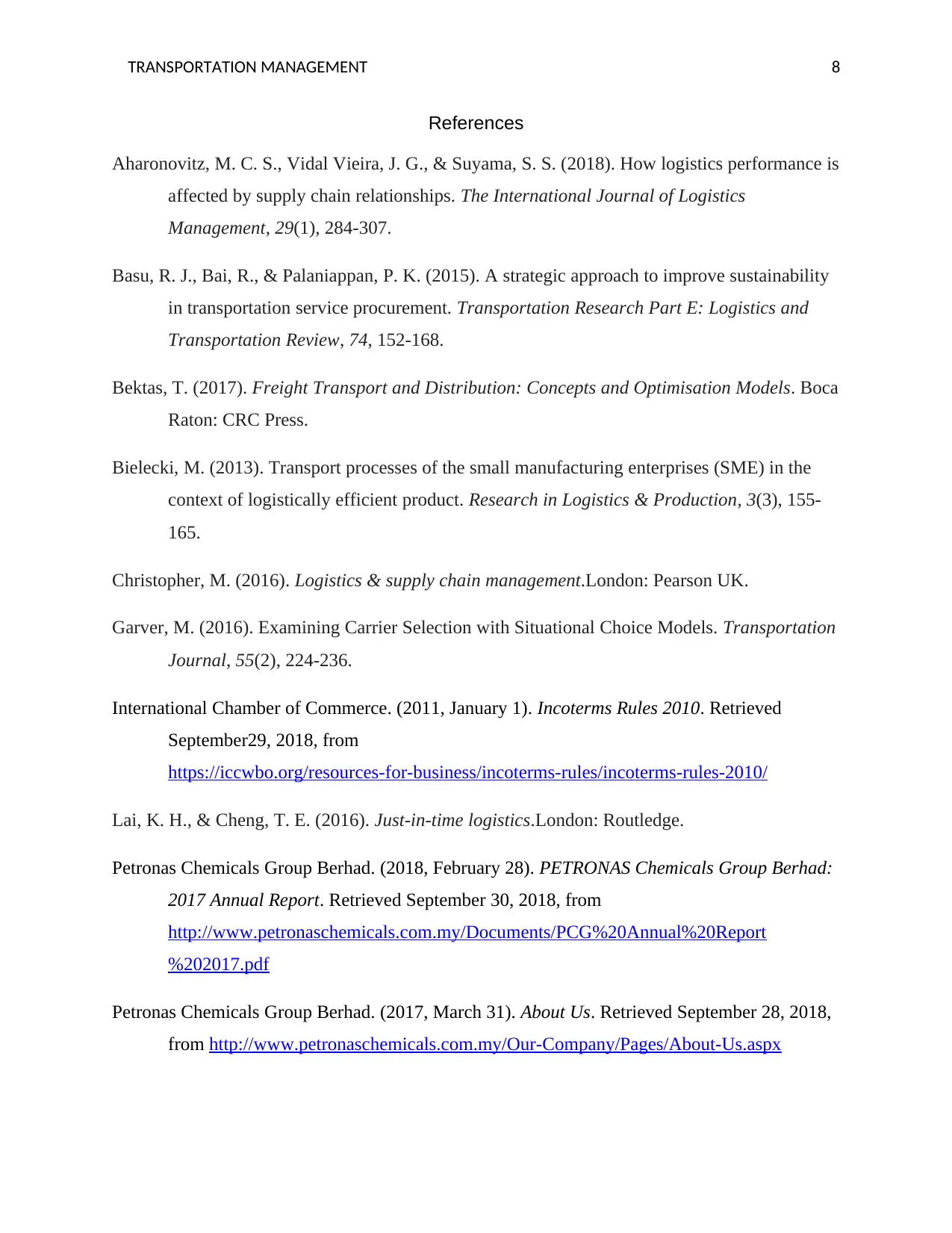
TRANSPORTATION MANAGEMENT 8
References
Aharonovitz, M. C. S., Vidal Vieira, J. G., & Suyama, S. S. (2018). How logistics performance is
affected by supply chain relationships. The International Journal of Logistics
Management, 29(1), 284-307.
Basu, R. J., Bai, R., & Palaniappan, P. K. (2015). A strategic approach to improve sustainability
in transportation service procurement. Transportation Research Part E: Logistics and
Transportation Review, 74, 152-168.
Bektas, T. (2017). Freight Transport and Distribution: Concepts and Optimisation Models. Boca
Raton: CRC Press.
Bielecki, M. (2013). Transport processes of the small manufacturing enterprises (SME) in the
context of logistically efficient product. Research in Logistics & Production, 3(3), 155-
165.
Christopher, M. (2016). Logistics & supply chain management.London: Pearson UK.
Garver, M. (2016). Examining Carrier Selection with Situational Choice Models. Transportation
Journal, 55(2), 224-236.
International Chamber of Commerce. (2011, January 1). Incoterms Rules 2010. Retrieved
September29, 2018, from
https://iccwbo.org/resources-for-business/incoterms-rules/incoterms-rules-2010/
Lai, K. H., & Cheng, T. E. (2016). Just-in-time logistics.London: Routledge.
Petronas Chemicals Group Berhad. (2018, February 28). PETRONAS Chemicals Group Berhad:
2017 Annual Report. Retrieved September 30, 2018, from
http://www.petronaschemicals.com.my/Documents/PCG%20Annual%20Report
%202017.pdf
Petronas Chemicals Group Berhad. (2017, March 31). About Us. Retrieved September 28, 2018,
from http://www.petronaschemicals.com.my/Our-Company/Pages/About-Us.aspx
References
Aharonovitz, M. C. S., Vidal Vieira, J. G., & Suyama, S. S. (2018). How logistics performance is
affected by supply chain relationships. The International Journal of Logistics
Management, 29(1), 284-307.
Basu, R. J., Bai, R., & Palaniappan, P. K. (2015). A strategic approach to improve sustainability
in transportation service procurement. Transportation Research Part E: Logistics and
Transportation Review, 74, 152-168.
Bektas, T. (2017). Freight Transport and Distribution: Concepts and Optimisation Models. Boca
Raton: CRC Press.
Bielecki, M. (2013). Transport processes of the small manufacturing enterprises (SME) in the
context of logistically efficient product. Research in Logistics & Production, 3(3), 155-
165.
Christopher, M. (2016). Logistics & supply chain management.London: Pearson UK.
Garver, M. (2016). Examining Carrier Selection with Situational Choice Models. Transportation
Journal, 55(2), 224-236.
International Chamber of Commerce. (2011, January 1). Incoterms Rules 2010. Retrieved
September29, 2018, from
https://iccwbo.org/resources-for-business/incoterms-rules/incoterms-rules-2010/
Lai, K. H., & Cheng, T. E. (2016). Just-in-time logistics.London: Routledge.
Petronas Chemicals Group Berhad. (2018, February 28). PETRONAS Chemicals Group Berhad:
2017 Annual Report. Retrieved September 30, 2018, from
http://www.petronaschemicals.com.my/Documents/PCG%20Annual%20Report
%202017.pdf
Petronas Chemicals Group Berhad. (2017, March 31). About Us. Retrieved September 28, 2018,
from http://www.petronaschemicals.com.my/Our-Company/Pages/About-Us.aspx
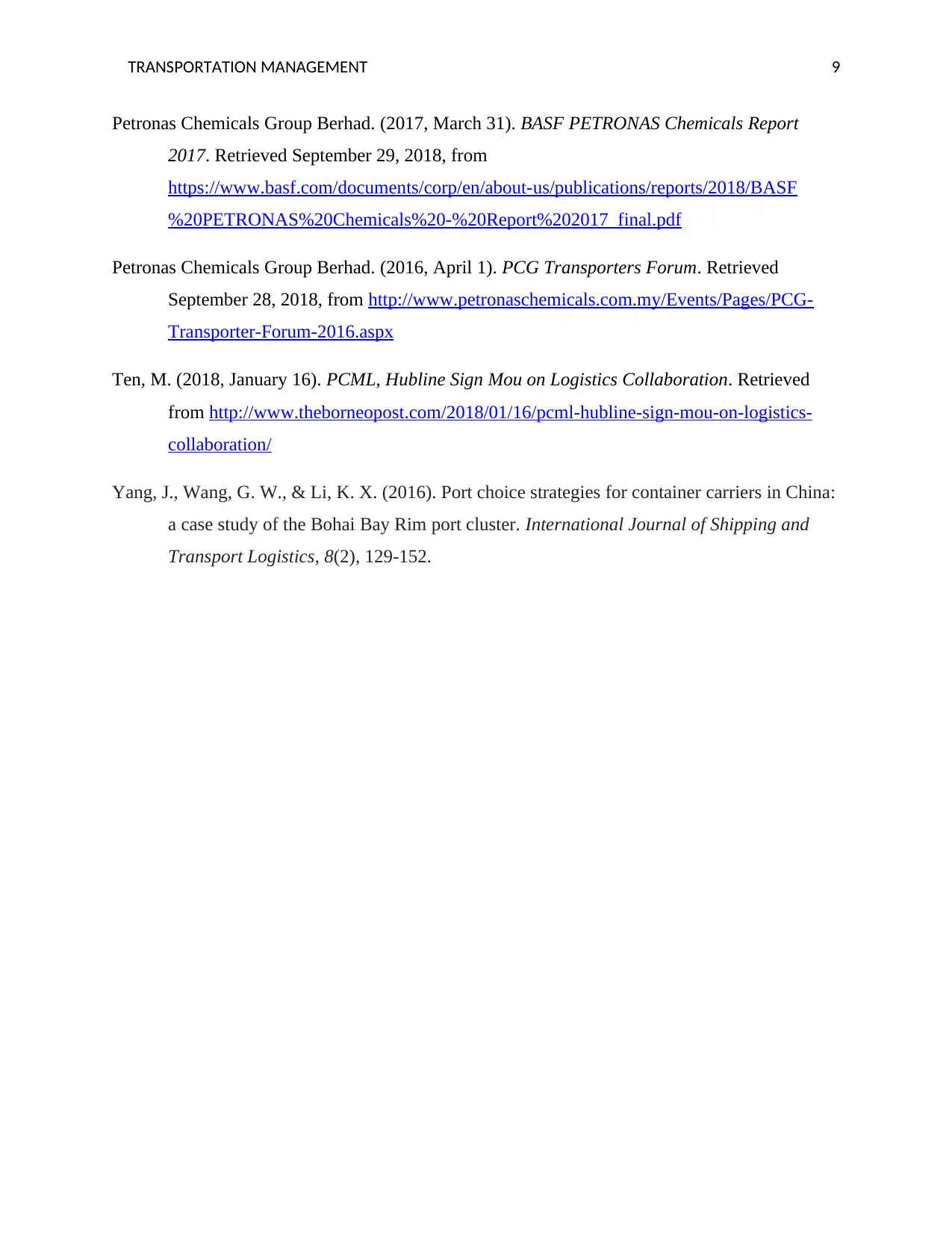
TRANSPORTATION MANAGEMENT 9
Petronas Chemicals Group Berhad. (2017, March 31). BASF PETRONAS Chemicals Report
2017. Retrieved September 29, 2018, from
https://www.basf.com/documents/corp/en/about-us/publications/reports/2018/BASF
%20PETRONAS%20Chemicals%20-%20Report%202017_final.pdf
Petronas Chemicals Group Berhad. (2016, April 1). PCG Transporters Forum. Retrieved
September 28, 2018, from http://www.petronaschemicals.com.my/Events/Pages/PCG-
Transporter-Forum-2016.aspx
Ten, M. (2018, January 16). PCML, Hubline Sign Mou on Logistics Collaboration. Retrieved
from http://www.theborneopost.com/2018/01/16/pcml-hubline-sign-mou-on-logistics-
collaboration/
Yang, J., Wang, G. W., & Li, K. X. (2016). Port choice strategies for container carriers in China:
a case study of the Bohai Bay Rim port cluster. International Journal of Shipping and
Transport Logistics, 8(2), 129-152.
Petronas Chemicals Group Berhad. (2017, March 31). BASF PETRONAS Chemicals Report
2017. Retrieved September 29, 2018, from
https://www.basf.com/documents/corp/en/about-us/publications/reports/2018/BASF
%20PETRONAS%20Chemicals%20-%20Report%202017_final.pdf
Petronas Chemicals Group Berhad. (2016, April 1). PCG Transporters Forum. Retrieved
September 28, 2018, from http://www.petronaschemicals.com.my/Events/Pages/PCG-
Transporter-Forum-2016.aspx
Ten, M. (2018, January 16). PCML, Hubline Sign Mou on Logistics Collaboration. Retrieved
from http://www.theborneopost.com/2018/01/16/pcml-hubline-sign-mou-on-logistics-
collaboration/
Yang, J., Wang, G. W., & Li, K. X. (2016). Port choice strategies for container carriers in China:
a case study of the Bohai Bay Rim port cluster. International Journal of Shipping and
Transport Logistics, 8(2), 129-152.
⊘ This is a preview!⊘
Do you want full access?
Subscribe today to unlock all pages.

Trusted by 1+ million students worldwide
1 out of 9
Related Documents
Your All-in-One AI-Powered Toolkit for Academic Success.
+13062052269
info@desklib.com
Available 24*7 on WhatsApp / Email
![[object Object]](/_next/static/media/star-bottom.7253800d.svg)
Unlock your academic potential
Copyright © 2020–2026 A2Z Services. All Rights Reserved. Developed and managed by ZUCOL.





